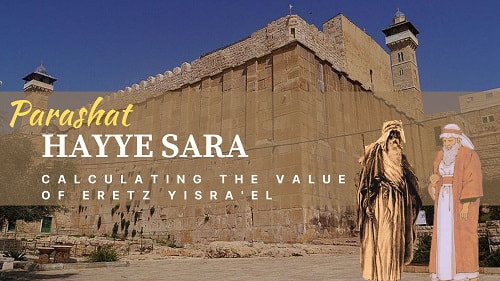|
By: HaRav Menashe Sasson Reporting from Jerusalem, Israel Published in the U.S.A. Parasha Hayye Sara tells the story of the death of Sara, saying that: “Sara died in Qiryat Arba, which is in Hebron, in the land of Kena’an.” Bereshit 23:1-2. Abraham, seeking to purchase a burial site for Sara, went to the elders of Qiryat Arba and, through the elders, tendered to Efron the Hitti, an offer to purchase the Cave of Makhpela ([מערת המכפלה], literally, The Cave of Doubles). Addressing the elders of Qiryat Arba, Abraham said:
Bereshit 22:8-9. “Efron the Hitti answered Abraham . . . , saying ‘No, my lord, hear me. The field I give thee, and the cave that is in it, I give thee. . . . Bury thy dead.’” Bereshit 23:10-12. Abraham responded, “But if thou wilt give it, . . . I will give thee the price of the field. . . .” Id., 23:13. Efron then states his price: “My lord . . . , a piece of land worth four hundred shekels of silver; what is that between me and thee. Bury thy dead.” Id. 23:15. After Efron negotiates with Abraham by asking, “What’s a mere four hundred shekels between “friends,’” Abraham accepted Efron’s offer to sell the field, which included the Cave of Makhpela [מערת המכפלה] and paid Efron the purchase price. Efron then transferred title of the field and cave to Abraham. The Ramban (Moses ben Nahman, aka: Nahmanides (1194 (Spain)-1270 (Jerusalem)) explains that Abraham desired only to purchase the Cave of Makhpela [מערת המכפלה]
Ramban, Commentary on the Torah. Bereshit 23:9. Some commentators have suggested that Efron engaged in conduct which was less than honorable with respect to the sale to Abraham of the field which contains the Cave of Makhpela [מערת המכפלה]. To determine whether, as the Ramban pointed out, Efron’s conduct in this transaction was “good” or “trickery,” we must begin with the basic postulate that there are two, and only two, methods of acquiring title or ownership of property. One method is by force or fraud; the other is by voluntary agreement. Acquiring property by force or fraud may be either legal or illegal. Obtaining property by force or fraud is usually assumed to be illegal, as in the case of robbery, burglary, misrepresentation or concealment of material facts (or, as Ramban might say, “trickery”). Legally acquiring property by force is accomplished when government compels individuals, against their will, to pay taxes or to otherwise transfer something of value to the government. Examples include the forced sale of real estate to the government (also known as “condemnation” or “the power of eminent domain”) and the forced transfer of labor services to the government, such as with jury service or military conscription. Acquiring property by voluntary agreement involves two or more people agreeing on the terms which will govern the transfer of ownership of property from one person to one or more other persons, and includes both the sale of goods and services as well as gifts. Regarding Abraham’s search for a burial site for Sara, the Talmud teaches that Abraham was unable to find a suitable location “until he purchased [the Cave of Makhpela (מערת המכפלה)] for four hundred silver shekels” T.B. Masechet Sanhedrin 111a. Thus, we learn that Abraham sought locations other than the Cave of Makhpela [מערת המכפלה] and failed to find any other location which he deemed suitable. Finding the Cave of Makhpela [מערת המכפלה] to be a suitable burial place, Abraham initiated negotiations for its purchase by telling the elders of Qiryat Arba that he, Abraham, was willing to pay “the full price” for the Cave of Makhpela [מערת המכפלה]. Bereshit 22:8-9. Efron responded, “saying ‘No, my lord, hear me. The field I give thee, and the cave that is in it, I give thee. . . . Bury thy dead.’” Bereshit 23:10-12. Abraham, however, did not want to receive the Cave as a gift and then reasserted his offer to purchase the field and the Cave, saying. “But if thou wilt give it, . . . I will give thee the price of the field. . . .” Id., 23:13. In summary, we see that Abraham offered to purchase the Cave. Efron declined to sell only the Cave, but offered to make Abraham a gift of both the Cave and the field in which it was located. Abraham responded by declining the offer of a gift and by reasserting his willingness to pay “the price of the field.” Id. It was only after these negotiations that Efron named his price for the field and the Cave, a price to which Abraham readily agreed. The question which is often raised is whether the sale price of 400 shekels of silver was “too high” or “unreasonable.” Stated differently, the question is whether the sale price exceeded the “value” of the Cave and field in which it was located or was somehow an “unfair” price. To answer this question, we must turn to the issue of “valuation” and “fair” pricing. When attempting to determine the “value” or “fair” price of an item, a mistake which is often made is to assume that there is a connection between the current “value” or “fair” price and what the owner paid to acquire or manufacture the item. Although a seller may consider his cost of acquisition when setting the price for an item he wants to sell, such cost-basis pricing does not determine the item’s current value. If a seller overpaid for an item, or the market price for the item has dropped since the seller acquired the item, no amount of wishful thinking on the part of the seller will raise the current market price of the item. Rather, the real determinate of “value” in any given transaction is the subjective value of the item in the minds of both the buyer and the seller. Simply stated, a sale will occur if, and only, if, the buyer prefers acquiring ownership of the item more than he values continued possession of the amount to be paid the item and if the seller prefers acquiring the amount to be paid for the item more than he prefers continued ownership of the item to be sold. In the case of the Cave of Makhpela [מערת המכפלה], the value to Abraham of that parcel of real estate equaled or exceeded 400 shekels of silver. How do we know this? We know this because Abraham, with full knowledge of what he was buying and without being compelled to make the purchase, voluntarily agreed to pay 400 shekels of silver for the Cave of Makhpela [מערת המכפלה]. Likewise, we know that Efron, valued the receipt of 400 shekels of silver more than he valued retaining ownership of the Cave of Makhpela [מערת המכפלה]; if things had been otherwise, the sale would not have occurred. The Talmud tells us that “Rabbi Shimon ben Yoḥai said: “The Holy One, Blessed be He, gave Yisra’el three precious gifts, all of which were given only by means of suffering: Torah, Eretz Yisrael, and the World-to-Come. [שלֹש מתנות טובות נתן הקדוש ברוך הוא לישראל, וכולן לֹא נתנן אלא על ידי יסורין, אלו הן: תורה וארץ ישראל והעולם הבא]” T.B. Mesekhet Berakhot 5a. Thus, contrary to our after-the-fact assessment of the value to Abraham of the Cave of Makhpela [מערת המכפלה], where we might view 400 shekels of silver to be an “unfair” or exploitive price, we see that, in fact, 400 shekels of silver represented the market price for the Cave of Makhpela [מערת המכפלה] at the time Abraham consummated the purchase. As demonstrated above, the market price for something is the price on which a willing buyer and a willing seller agree, at the time and place of the transaction. Therefore, because Abraham and Efron agreed on 400 shekels of silver for the Cave of Makhpela [מערת המכפלה] and the field that surrounds it, that was the market price at the time of that transaction. Unlike Abraham, who purchased the Cave of Makhpela [מערת המכפלה] and the field that surrounds it, HaShem made a gift of the entirety of Eretz Yisra’el to the Jewish people. Thus, the question that each Jew must ask is: “How much to I value Eretz Yisra’el?” Given that Eretz Yisra’el is one of three things that can be acquired only through suffering, each Jew must ask: “How much suffering am I willing to endure to acquire my portion in Eretz Yisra’el?” To those who are contemplating Aliyah (Jewish immigration to Eretz Yisra’el), but who might believe the cost-of-living or taxes in Eretz Yisra’el are too high, or that perhaps the non-economic costs of making Aliyah might be too high, may HaShem bless you to acquire a subjective valuation of Eretz Yisra’el which will allow you, like Abraham Abinu, do what is necessary to acquire your portion in Eretz Yisra’el. שבת שלום Shabbat Shalom! Copyright © The Israel Foundation. All Rights Reserved.
0 Comments
Your comment will be posted after it is approved.
Leave a Reply. |
THE ISRAEL FOUNDATION





